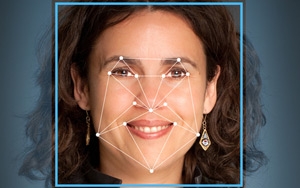Facebook Presses Judge To Dismiss 'Faceprint' Lawsuit
- by Wendy Davis @wendyndavis, November 25, 2015
 Facebook is asking a federal judge to reject arguments that it violated an Illinois privacy law by creating a database of "faceprints."
Facebook is asking a federal judge to reject arguments that it violated an Illinois privacy law by creating a database of "faceprints."
The history of the Illinois Biometric Information Privacy Act "overwhelmingly supports the conclusion" that it doesn't cover "the application of facial-recognition technology to photographs uploaded to Facebook," the company says in court papers filed on Tuesday.
The social networking service's papers mark its latest attempt to convince U.S. District Court Judge James Donato in San Francisco to dismiss a lawsuit brought by Illinois Facebook users. The users allege that the social networking service violates a 2008 biometric privacy law that requires companies to obtain written releases from people before collecting a "scan of hand or face geometry," fingerprints, voiceprints and other biometric data.
The lawsuit -- brought earlier this year by Carlo Licata and other Facebook users -- stems from the company's automatic tagging feature, which recognizes users' faces and suggests their names when they appear in photos uploaded by their friends. To accomplish this, Facebook draws on its vast store of photos posted by users.
Facebook says the Illinois law only applies to faceprints derived from in-person scans. The company points to a section of the law that specifically excludes photos from the definition of biometric identifiers.
But Licata and the others say the company's interpretation of the law is "illogical" and would lead to "absurd" conclusions. "Under Facebook’s interpretation, a voiceprint extracted from a wiretap would not be regulated by BIPA because it was not collected 'in person.' Nor would be a retina scan extracted from a photograph shot by a hidden camera with a high-powered zoom lens," the users said in papers filed several weeks ago. "But a retina scan or voiceprint extracted from a knowing subject who presents himself or herself at a 'console' or 'kiosk' would be regulated."
Facebook counters in its most recent papers that its automatic tagging feature "has nothing in common" with retina scans or voiceprints.
"Facebook does not take any images at all, specialized or otherwise. Instead, a person takes a picture and then, at some point later, he or she might voluntarily upload it to Facebook," the company says. "Tag Suggestions does not involve a specialized recording device; it is based on ordinary photos taken by ordinary people every day."
The photo service Shutterfly, which is facing a similar lawsuit in Illinois, is making the same argument. No judges have yet decided whether the Illinois law applies to faceprints that are extracted from photographs.
Donato will hold conference in the case on Dec. 16.


